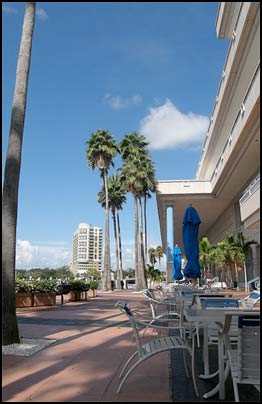
Tampa, FL, and Charlotte, NC, each received $50 million in federal funds for security at their national political conventions. Charlotte purchased more than $300,000 worth of bicycles for its cops, and lavished over $700,000 on a “command center upgrade.” Tampa bought itself a new armored SWAT vehicle with a price tag crowding very close on $300,000, and spent more than a million buckaroonies on spy gear, including video linkage between helicopters and the police down below.
If you’re anything like the people at House the Homeless, every time you hear numbers like that, your mind automatically translates the figures into how many meals, how many socks, how many months of rent for a struggling family whose kids need a table to do their homework on and a roof under which to do it.
And how have the homeless been faring, in the two cities thronged by visitors including America’s best and brightest?
On August 24, Elisabeth Parker reported on the mindset of local authorities in Tampa, which was preparing for the Republican National Convention. Bob Buckhorn, the mayor, said that the city had set no policy with the intention of removing people experiencing homelessness. A police spokesperson said there were no plans to displace the estimated 700 chronically homeless people from the downtown area — except for the streets that would be closed to all pedestrians.
The entrenched downtown dwellers represent only a small fraction, because the greater Tampa area contains around 16,000 homeless people, and about a fifth of them are children, which divides out to about 3,200 homeless children. How does a major political party have the nerve to hold its big self-congratulatory bash in a city with 3,200 homeless kids?
A team from Hillsborough County’s Homeless Coalition passed out flyers with maps detailing the closed areas, while police officers were advised by their department’s homeless liaison to recommend that people go to the shelters. But according to people on the streets, the Salvation Army shelter was already full, two public libraries where many were accustomed to sit out the days had been closed, and police told people to remove their belongings from hiding places in the shrubbery.
Tampa also expected to cope with 15,000 protesters in town for the convention — strangely, almost the same as the number of Greater Tampa’s homeless residents. Various news sources reported that 10-day vouchers would be available for the Good Samaritan Inn, yet when the owner of the inn was contacted, he told a confused tale of someone showing up with a voucher that was then rescinded by a county official, and no more had been seen since.
Technically, the homeless are allowed to be nowhere — their only acceptable posture is upright and in motion. A deputy gave a quotation about how it’s always somebody else’s property, whether it’s public property or not. There’s a very basic question here. Doesn’t public property belong to the people? Isn’t that what “public” means?
A woman who works with the homeless heard numerous stories of people being “run out” of downtown. When the reporter contacted the police department to confirm or deny, it had nothing to say. By August 28, Jason Cherkis was telling The Huffington Post:
The convention has cost the homeless not just regular sleeping spots and peace of mind. In some cases, it has cost them their belongings. The homeless used to squat near Trinity Cafe along the street. The police recently put a stop to it […] just prior to the convention, city garbage collectors showed up with a police escort. They moved down the street throwing away any belongings left unattended. In one instance […] a woman claimed her possessions but the city workers tossed them anyway.
Homeless people reported being chased to at least a mile away from the convention site. Parks were off-limits, and apparently, police warnings were spread the old-fashioned viral way, by regular speech. The word was going around: stay away, only sleep north of the overpass, don’t be caught walking around with a backpack. Everybody seemed to know somebody who had been charged with trespassing. According to the rumor, the police imported from other towns might be relatively soft, but the Tampa police would be ruthless.
But the next day, BBC reporter Daniel Nasaw related a mirror-image version of that story. A Tampa police spokesperson told him that the extra out-of-town police were the ones the homeless needed to be wary of, unfamiliar as they were with the city’s relatively lenient treatment of the homeless. (Seems like the strangers must have been given some kind of briefing before being turned loose on the streets of Tampa. Couldn’t that information have been included?) Nasaw wrote:
Secret Service and police have blocked off a swathe of downtown Tampa, set up check points, erected security fences, and otherwise disrupted the ordinary flow of pedestrian and automobile traffic. Security […] has created hassles for everyone who lives and works in the city. And for the city’s large homeless population, the convention presents a major disruption in an already tenuous existence.
Pastor Tom Atchison, the founder of homeless services organization New Beginnings, pointed out how millions had been spent by the city for law enforcement and security, while no provisions were made for the people experiencing homelessness, whose lives are already tough enough. Typical was homeless veteran Ernest Grandison, who told Nasaw that people were prevented from reaching soup kitchens and other necessary destinations, and that the security cordon downtown added an hour and a half to the walk to his usual Sunday breakfast church. He told the reporter:
Now, if you stop to rest on a bench, they pull up and say, ‘You need to leave’.
Reactions?
Source: “Downtown homeless get directions for how to cope with RNC,” Tamps Bay Times, 08/24/12
Source: “Tampa Homeless Say They’re Barred From RNC Convention Site,” The Huffington Post, 08/28/12
Source: “Tampa homeless ‘sidelined’ by Republican convention pomp,” BBC News, 08/29/12
Image by Azalia_N. (Azalia Negron).0


